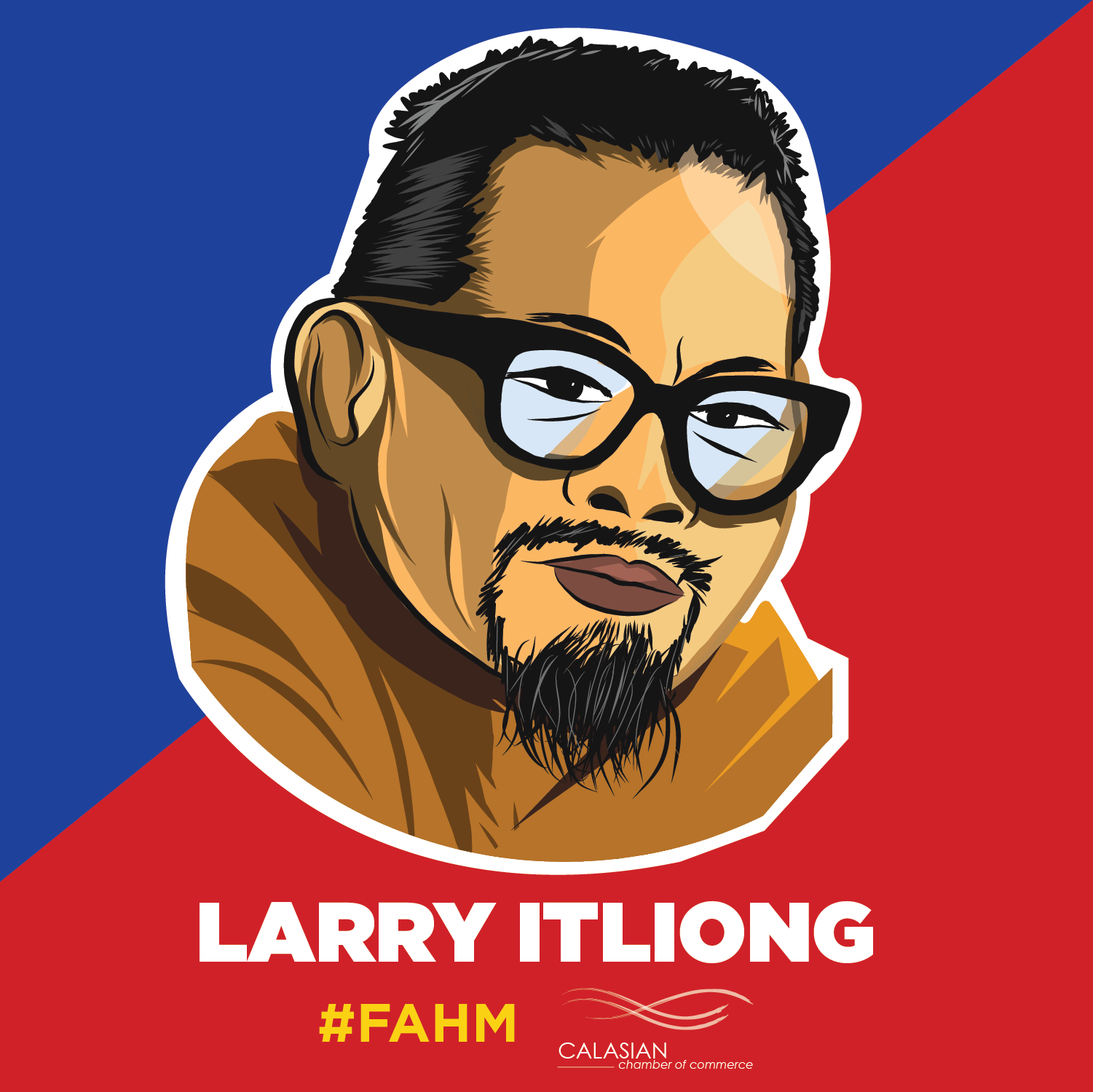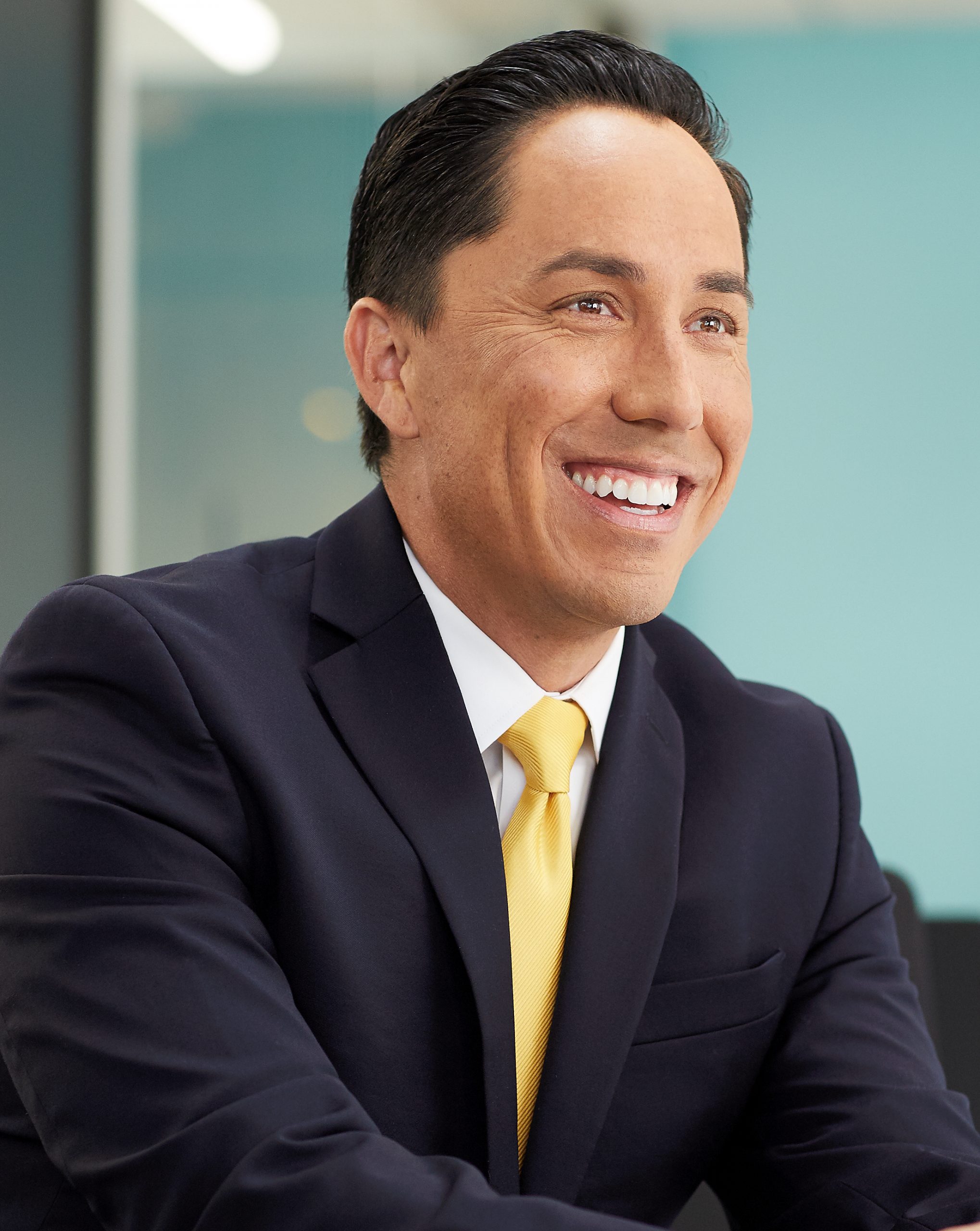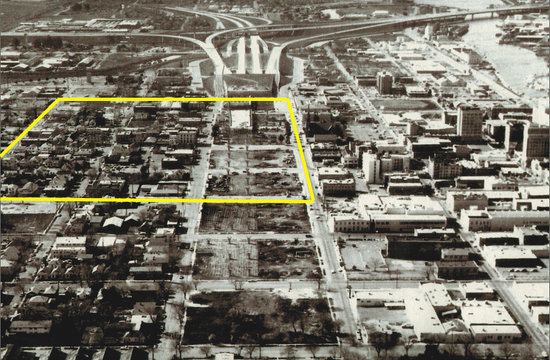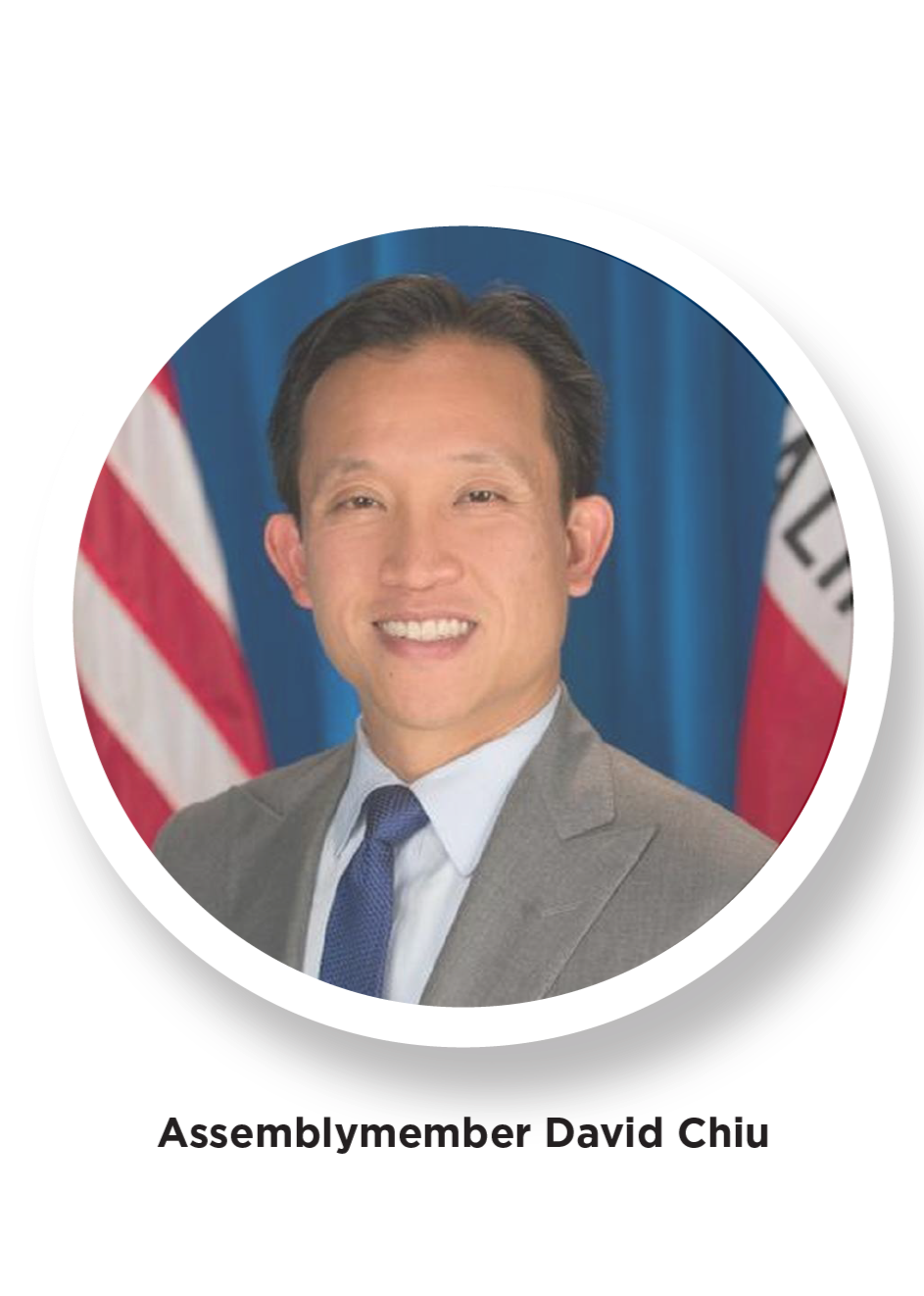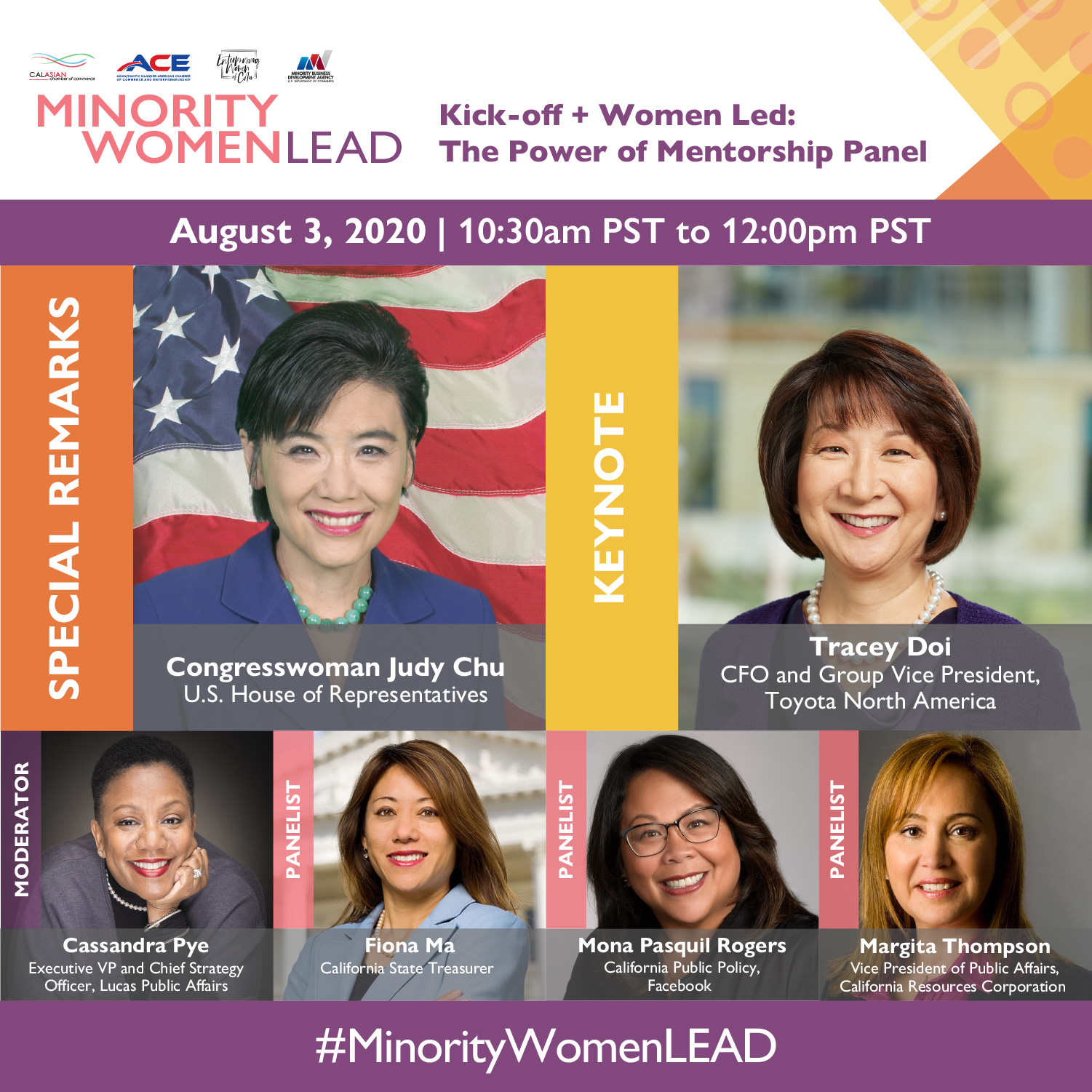Larry Itliong, the Filipino Labor Leader who Changed the Nation
In celebration of Filipino American History Month (#FAHM) we are proud to shine a spotlight on Larry Itliong and his remarkable achievements. From a Filipino immigrant to renowned labor organizer, Larry Itliong helped to revolutionize the West Coast labor movement.
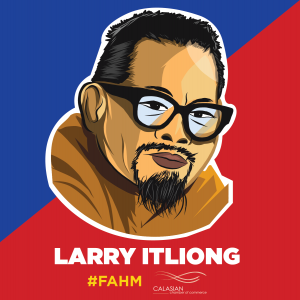
Larry Itliong immigrated to the United States in 1929 when he was a teenager, and worked as a laborer in Alaska. Since he was young he dreamed of working in the justice system, fighting for the rights of the poor. Although he never became a lawyer, he achieved his dream for helping people by becoming a labor leader and organizer. From Alaska, Washington, California, Montana, and South Dakota, Larry dedicated his time to organizing unions and strikes for his fellow migrant workers who traveled seasonally to follow the harvest.
After World War II, Larry settled down in Little Manila, Stockton to raise his family. In 1948, Larry Iltiong worked together with his fellow Filipino labor leaders Philip Vera Cruz, Rudy Delvo, Ernesto Mangaoang, and Chris Mensalvas to organize an asparagus strike in Stockton which became the first major agricultural strike after World War II. This was the second asparagus strike since the groundbreaking success achieved by the Filipino Agricultural Labor Association (FALA) in 1939.
From there, Larry became quite the renowned labor leader in the Filipino American community. In 1953, he became the Vice-President of the International Longshore and Warehouse Union Local 37 in Seattle. From 1954-1956, he served as the secretary of the Filipino Community of Stockton. In 1956, he founded the Filipino Farm Labor Union in Stockton. In 1957, he was elected President of the Filipino Voters League in Stockton. Over time, he had recruited more than a thousand new members to join the Agricultural Workers Organizing Committee (AWOC).
In May 1965, Larry Itliong and Ben Gines successfully striked for a wage increase from the Coachella Valley grape growers. Following that success, in September 1965, Larry travelled to Delano County to help organize and unionize the Filipino American grape workers. Gathered at Filipino Hall, the Filipino American laborers unanimously voted to strike. They were an aging generation who could no longer work tirelessly with low wages and no benefits. Their migrant work life built their world view and they were able to “see their labor in different settings, and to witness the power of organized labor” in making a difference.
But they couldn’t do this alone — if they went on strike, the Delano grape growers would use the Mexican Americans to break their strike. A revolutionary partnership was then born.
Larry Itliong reached out to Cesar Chavez and convinced him to lead the Mexican American laborers in a joint strike with the Filipino Americans. To cement this union, Cesar Chavez’s National Farm Workers Association (NFWA) merged with Philip Vera Cruz’s Agricultural Workers Organizing Committee (AWOC) to form the United Farm Workers (UFW), historically marking the partnership between the Filipino Americans and Mexican Americans.
The Delano grape strike was a long, grueling movement that lasted for five harsh years, and the results of their success changed the course of American history forever. Contracts created between the UWF and the grape growers would set a precedent in increasing wages, improving working conditions, and adding benefits for the current and future generation of farm laborers.
In 1971, Larry Itliong resigned from the UWF following disagreements in the direction of governance within the union. According to scholar Alex Fabros, he was disappointed by how the “Filipinos were marginalized and never given true power within the union”. Although Larry left the UWF, he continued to spend his time supporting labor movements. He worked with Philip Vera Cruz to advocate and construct the Paolo Agbayani Village, a retirement home for aging laborers that is still operated by the UFW today. He passed away in 1977 at the age of 63.
Over the years, the achievements of Larry Itliong and the Filipino American laborers have fallen to wayside in history. Success of the Delano grape strike of 1965 should have been celebrated as a powerful and revolutionary union between different immigrant cultures working together for a common goal. New emerging leaders in the Filipino American community have been doing their best to reclaim the lost history of their people. It’s thanks to their continued efforts that the true history of the past can be remembered today.
On Labor Day weekend in 2015, nearly 500 people gathered together at Delano’s Filipino Hall to celebrate the Filipino American contribution to the farm labor movement. It was also a time for them to commemorate the first strike vote made by the Filipinos and their decision walk off the fields 50 years ago. Among them was Paul Chavez, the son of Cesar Chavez. He said to NBC News, “There are names lost in history, and today’s ceremony goes a ways to rectifying that… We should now look to recognize these unsung heroes… Latinos and Filipinos alike.”
On October 25, 2015, in commemoration of Larry Itliong’s birthday in 1913, California Governor Jerry Brown signed the bill to establish Larry Itliong Day.
On the same day in 2019, Governor Gavin Newsom issued a proclamation to declare the day as “Larry Itliong Day” in the State of California, securing his mark in American history.
You can read more about Larry Itliong’s life and legacy in the book written by Gayle Romasanta and the late Dr. Dawn Bohulano Mabalon in Journey for Justice: The Life of Larry Itliong.
#FAHM | Todd Gloria wants to be San Diego's New Mayor
 Born and raised in San Diego, Todd Gloria knows what it is like to live through hardships and struggles. Growing up, his family was not wealthy, but their hearts were rich. As someone of Filipino, Dutch, Puerto Rican, and Native American descent, as well as openly gay, Gloria faced many difficult challenges.
Born and raised in San Diego, Todd Gloria knows what it is like to live through hardships and struggles. Growing up, his family was not wealthy, but their hearts were rich. As someone of Filipino, Dutch, Puerto Rican, and Native American descent, as well as openly gay, Gloria faced many difficult challenges.
From a young age, Gloria developed a passion for public service and the desire to create a better city that served people without discrimination or injustice. He began his career in public service at the County of San Diego’s Health and Human Services Agency. He went on to serve as the District Director to U.S. Congresswoman Susan Davis as a San Diego Housing Commissioner and as a member of the Mid-City Prostitution Impact Panel.
His notable achievements include: San Diego City Councilmember in 2008, Council President in 2012, and Interim Mayor from 2013-2014. His exemplary dedication to the city helped citizens regain trust in the government, and he was even named San Diego’s “favorite elected official” by San Diego City Beat readers 8 times in a row.
In 2016, Gloria was elected Assemblymember to represent the 78th Assembly District, which includes San Diego, Coronado, Del Mar, Imperial Beach and Solana Beach. He currently holds the leadership position of Majority Whip, and also serves as the Vice Chair of the California Legislative LGBT Caucus. He has been credited with bringing in thousands of affordable housing units to the City of San Diego. He has also been a champion for increased infrastructure investment. As an Assemblymember, Gloria has passed legislation on many important issues including: affordable housing, fighting gun violence, climate change, and providing resources for the homeless.
As a native San Diegan, Todd Gloria is determined to prioritize city and its citizens above political agendas. He knows that San Diego needs strong, experienced, and progressive leadership in the Mayor’s Office in order to effect real change. As mayor, he is dedicated to create real and effective solutions to the underlying problems that San Diegans face everyday. With his extensive career in public service, Gloria is confident he can be the mayor that best represents San Diego.
“San Diegans deserve a Mayor who works for all of us and will make us a city of opportunity that invests in every neighborhood and every San Diegan.”
Todd Gloria will be running for San Diego Mayor on Election Day, November 3, 2020.
The priorities of his mayoral campaign revolve around the following issues:
Housing
Having lived in San Diego for so long, Todd Gloria wants to improve housing conditions all throughout San Diego, especially for the middle and working class citizens. As mayor he plans to implement:
- New housing construction nearby transit areas
- Increased investment into transit and multimodal infrastructure
- Creation of affordable homes for the middle and working class
- Rent stabilization for all renters
- Enforcement of the current law that states short-term rentals are not a permitted use under the Municipal Code
Homelessness
Gloria sees the struggles that homeless people face in San Diego, and he wants to do his part to eliminate this crisis by providing solutions that will put people first. He plans to:
- Make homelessness the city’s Top Priority
- Implement efficient data-driven strategies
- Use housing first solutions with supportive services including MHSA funding
- Increase transparency in taxpayer resources
- Have stronger cross-jurisdictional and regional collaboration
Transportation
Gloria wants to create effective and efficient transportation for all citizens to use. As mayor, his administration’s transportation strategy will be consistent with the Climate Action Plan and place priority on the needs of the City’s residents, visitors, and businesses. He will:
- Consolidate the various transportation functions to create a single Mobility Department
- Fix roads and improve ADA/Accessibility for all
- Create a connected network of separated and protected bike lanes, with increased bicycle safety measures
- Improve San Diego’s transit system and routes
- Guide and lead the San Diego Association of Governments (SANDAG) to ensure transparency and accountability to the public
- Improve the San Diego Airport & the Port of San Diego
- Create walkable communities with accessibility and pedestrian oriented infrastructure
- And more!
Climate
During his term as Interim Mayor of San Diego, Gloria introduced an aggressive and groundbreaking Climate Action Plan. As mayor, his administration will be committed to creating solutions to combat the harmful effects of climate change. This includes:
- Full implementation of the groundbreaking Climate Action Plan
- Constructing facilities to capture storm water and fixing crumbling infrastructures
- Zero Waste Ordinance
- Preparation and Planning for Sea Level Rise
- Improving air quality
- Fixing the pollution of the Tijuana River Valley
Racial Justice
Gloria has spent much of his career fighting to advance equity, inclusion, and justice against racism and oppression. He plans to create laws that will address these issues at the systemic core, rather than only at the surface level. His administration is committed to:
- Increase affordable housing
- Independent Police Review Commission with full investigatory powers to create check-and-balance
- Investing in historically underserved communities & youth
- Police reform to address use-of-force tactics, prioritize de-escalation, demilitarize law enforcement, removing unnecessary excessive surveillance, stopping overcriminalization, reviewing hiring practices, and addressing gang injunctions
Improve Public Safety & Stand Against Gun Violence
Gloria is dedicated to improving the safety measures for all members of the public. He is a firm believer that gun safety is public safety, and has authorized legislation to regulate concealed carry weapons in California. As mayor, to increase public protection, he will:
- Join the Mayors Against Illegal Guns coalition to work with other Mayors to advance common-sense gun law
- Strive to improve the relationship between public safety workers and citizens to generate trust
- Fire fighters, lifeguards, medical service providers, police officers, and more
- Fairly distribute public safety resources throughout the city
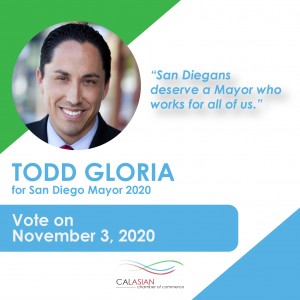 We are continuing to celebrate the achievements of Filipino-Americans as part of Filipino-American History Month (FAHM)!
We are continuing to celebrate the achievements of Filipino-Americans as part of Filipino-American History Month (FAHM)!
Learn more about Todd Gloria here, and follow us on Twitter, Instagram, and Facebook to keep up on more FAHM content.
Little Manila: The Recovered Soul of Stockton
Historically, Stockton was home to the largest population of Filipinos in America. Many Filipinos had been specifically recruited to Stockton as agricultural and domestic workers, and they became the largest agricultural workforce for Central Valley. Attracted by the “American Dream” and the chance to lift their families out of poverty, young Filipino immigrants arrived in droves, ready to make it big.
The reality was strikingly different from the dreams and opportunities that they were taught. The year 1898 was the beginning of American colonization of the Philippines, and while the teachers touted the liberties of America, they had failed to mention of the existing issues of discrimination and racism.
But that would not deter the Filipinos. Although they were spread out across the west coast, they created a space for themselves in Stockton right next to Chinatown and Japantown. This “Little Manila” was a thriving community— a central hub for all Filipinos to gather, network, and even reunite with family and friends who were just arriving onto American soil.
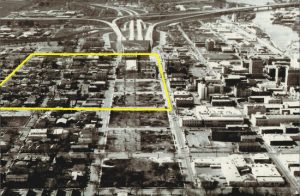 Covering a four-block area, the boundary of Little Manila extended from south of Main Street to Lafayette and El Dorado Streets. It held many Filipino-owned businesses and organizations, including: restaurants, union halls, hotels, grocery stores, dance halls, barber shops, garages, and much more.
Covering a four-block area, the boundary of Little Manila extended from south of Main Street to Lafayette and El Dorado Streets. It held many Filipino-owned businesses and organizations, including: restaurants, union halls, hotels, grocery stores, dance halls, barber shops, garages, and much more.
As the economy took a downturn from the Great Depression, Filipinos faced even more discrimination and competition for jobs. They found work in the agriculture industry and eventually became the largest and main labor workforce in Central Valley. They harvested produce season after season, rain or shine. And one of the toughest crops to work with, asparagus, was skillfully and efficiently harvested by them. However, the working conditions were tough, and the meager pay of 90 cents for 100 pounds of asparagus a day was unfair compared to others who were getting paid higher wages and working under better conditions.

Fed up with the treatment they were receiving, the Filipino American community formed labor unions and held strikes against exploitative growers. It was tedious and grueling work, but their eventual success was worth it. In 1939, the Filipino Agricultural Laborers Association (FALA) won their strike against the asparagus industry. This massive victory sparked further successful union strikes across the land. Their success was critical in paving the path forward for future labor workers, including the famous 5-year Delano grape strike led by Larry Itliong, Ceasar Chavez, Philip Vera Cruz, Lupe Martinez, Dolores Huerta and Richard Chavez.
As World War II raged on in 1939, many Filipinos enlisted into the U.S Army. With their enlistment, Filipinos were granted citizenship, and the public perception of Filipinos in America changed for the better. These soldiers were often stationed in the Philippines, ended up marrying Filipina wives, and brought them into the States to start a family. After World War II, the Filipino community in Stockton thrived with new life, energy, and vigor. In 1946, it became the biggest Filipino community in the States.
Sadly, this came crashing down in the 1950s and 1960s, when the City of Stockton began their new urban redevelopment plan. Huge parts of Little Manila were torn down to make way for a large freeway and other fast food franchises. In 1970, the funding for the freeway construction ran out, and left the freeway as a “road to nowhere” while Little Manila and its community remained irreparably damaged and displaced.
 However, the Filipino-American community members were resilient, and in 1972 they succeeded in building the Filipino Plaza to reclaim a space for the displaced Filipino community in Stockton. In 1994, the Filipino American National Historical Society designated Stockton as the site for the Filipino American National Historical Society Museum, which opened in 2015. Thanks to the efforts of the Stockton FANHS and other new Filipino-American leaders, the Little Manila District was named one of the nation's most endangered historic places of 2003 by the National Trust for Historic Preservation. This would include historic buildings such as the Mariposa Hotel, the Rizal Social Club, and the Filipino Recreation Center.
However, the Filipino-American community members were resilient, and in 1972 they succeeded in building the Filipino Plaza to reclaim a space for the displaced Filipino community in Stockton. In 1994, the Filipino American National Historical Society designated Stockton as the site for the Filipino American National Historical Society Museum, which opened in 2015. Thanks to the efforts of the Stockton FANHS and other new Filipino-American leaders, the Little Manila District was named one of the nation's most endangered historic places of 2003 by the National Trust for Historic Preservation. This would include historic buildings such as the Mariposa Hotel, the Rizal Social Club, and the Filipino Recreation Center.
Even today, in 2020, the non-profit organization, Little Manila Foundation, co-founded by the late Dr. Dawn Bohulano Mabalon and Dillon Delvo, continues their efforts to preserving, restoring, and reclaiming Little Manila District. Founded in 1999, the Little Manila Foundation has created many programs to rebuild and connect the Filipino community together in Stockton, while educating the youth on the historic Filipino American contributions and struggles in America.
Although the flourishing community of Little Manila is no longer here, the residents of Little Manila District are still committed to reclaiming the importance of their history. You can help the Filipino American community by learning more about Stockton’s Historic Little Manila at the FANHS Museum or getting involved with the the Little Manila Foundation. You can also read about the history of Little Manila by picking up a copy of Little Manila Is in the Heart: The Making of the Filipina/o American Community in Stockton, California authored by Dr. Dawn Bohulano Mabalon.
Get to Know: Assemblymember David Chiu
The CalAsian Chamber’s Listening Tours have historically been a chance for locally-elected leaders to connect with those that they represent. The intentionally small attendance setting creates an open space for local small businesses and other community members to freely share their concerns and hold a constructive conversation with them. They have the opportunity to ask questions about the legislator's priorities, future challenges, and understand what these topics may mean for their businesses.
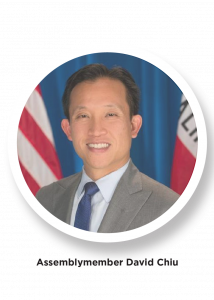 Assemblymember David Chiu represents California’s 17th Assembly District, which encompasses eastern San Francisco, and on October 5th, the CalAsian Chamber will host a Listening Tour for the community to engage with him. He also serves as Chair of the California API Legislative Caucus (APILC). As state legislator, Chiu’s current priorities are addressing the California affordability crisis with major investments in important programs in health care, housing affordability, homelessness, and education. His vast prior experience as President of the San Francisco Board of Supervisors, a criminal prosecutor, a civil rights attorney, and Small Business Commissioner makes him well prepared to advocate for California citizens.
Assemblymember David Chiu represents California’s 17th Assembly District, which encompasses eastern San Francisco, and on October 5th, the CalAsian Chamber will host a Listening Tour for the community to engage with him. He also serves as Chair of the California API Legislative Caucus (APILC). As state legislator, Chiu’s current priorities are addressing the California affordability crisis with major investments in important programs in health care, housing affordability, homelessness, and education. His vast prior experience as President of the San Francisco Board of Supervisors, a criminal prosecutor, a civil rights attorney, and Small Business Commissioner makes him well prepared to advocate for California citizens.
In 2018, Chiu authored 14 bills including:
- AB 2184 - Immigrant Business Inclusion Act
- AB 2923 - BART Transit-Oriented Development
- SB 866 - Preventing Anti-Labor Practices
He also fought to include $90M in the 2018 budget for outreach and education to ensure accurate counting for the upcoming 2020 Census.
In 2019, Chiu authored 11 bills including:
- AB 456 - Prompt Payment Sunset Elimination
- AB 1340 - Gainful Employment
- AB 1482 - Tenant Protection Act of 2019
He also allocated funding from the 2019 budget to important programs such as Health4All, Low Income Housing Tax Credit, and the Commission on Asian & Pacific Islander American Affairs.
Currently, he is focusing on passing legislation that will lead to increased housing protection during this crisis. AB 3088, will prevent evictions for non-payment of rent for tenants financially impacted by COVID-19.
“This will not be the ultimate solution to addressing COVID-19 evictions, but will tide us over for the next five months. This gives us the time to reconsider our options next legislative session and potentially work with a new federal administration on economic relief for struggling tenants and property owners.”
As part of the APILC, an organization that represents and advocates for API communities, Chiu and the APILC announced several COVID-19 Response Proposals in May 2020. According to Chiu,“This package seeks to alleviate some of the economic, political, and societal burdens on our API communities in California.”
One of the 5 bills they are supporting on top of these budget proposals is Assembly Bill 2598 proposed by Assemblymembers Rob Bonta (D-Oakland) and David Chiu, which will increase transparency and give local communities a greater say in local law enforcement agencies.
Additionally, in June 2020, the APILC announced it’s support for ACA 5 which would lift the affirmative action ban imposed by Proposition 209 in 1996. According to Chiu, “Removing the ban will allow for more equal opportunities in public contracting, public employment, and public education for all, including Asian Americans.”
Assemblymember David Chiu is determined to create policies that will better serve the citizens of California. On October 5, 2020, he will be addressing his priorities for this year during the CalAsian Chamber-hosted Listening Tour. For all people who are interested in upcoming policies, this is your chance to have a conversation with this elected official!
Let your voice be heard and register for the upcoming Listening Tour now!
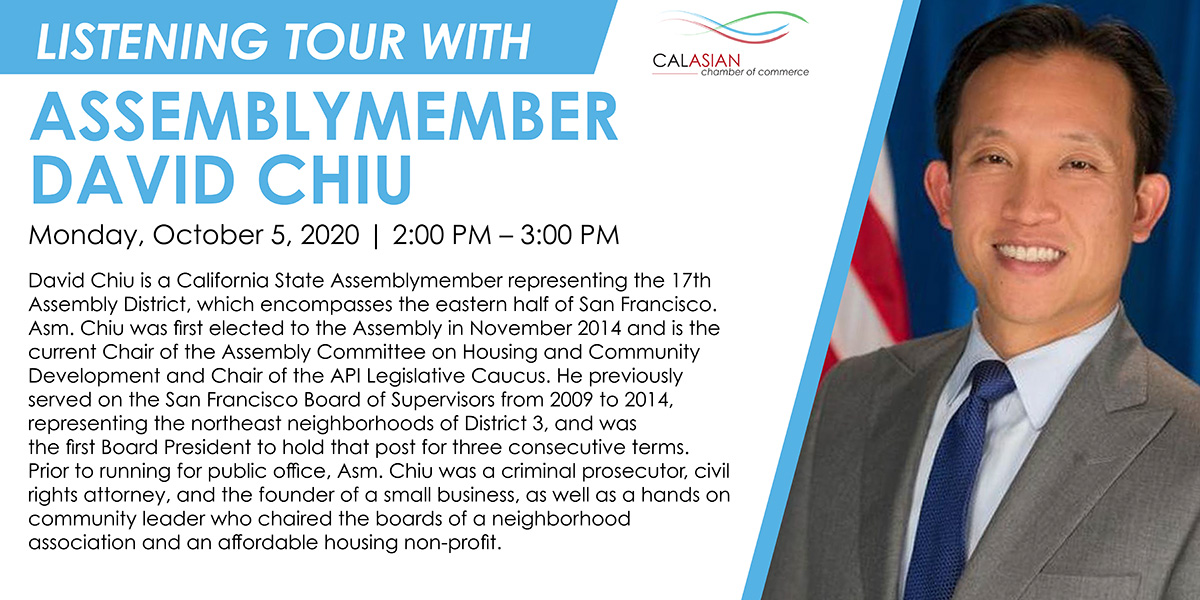
For more information on the 17th Assembly District Member and his policies, check out his website at https://a17.asmdc.org or visit the API Caucus website: https://apicaucus.legislature.ca.gov/.
#MinorityWomenLEAD | What We Took Away from a Month of Celebrating Women
Last month, we hosted Minority Women Lead to elevate the voices and stories of professional women of color. We launched our first conversation on the topic of the mentor-mentee relationship and the impact it has on leadership; learned what it takes to lead through change as a woman of color; heard the inspiring stories of women who have climbed up the ladder to lead their organizations and communities; and were inspired by the vital work being done to advance Diversity, Equity, and Inclusion within companies and institutions.
While this blog holds only a fraction of the wisdom we learned from all of our inspiring virtual conversations, here are the most valuable lessons we learned throughout the month:
Women Led: Power of Mentorship
Watch the full conversation here.
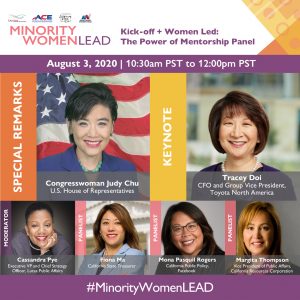 1. Mentorship is Partnership
1. Mentorship is PartnershipMentorship is a reciprocal, two-sided relationship. From an outside perspective, successful leaders stand alone at the top. But truthfully, the most successful leaders are those who have a strong trust in their team, network, and community.
Reflecting on her career over the years, keynote speaker Tracey Doi had this key piece of advice to share: “I've really been fortunate that I've been able to gain insights and inspirations from more than one mentor throughout my career.” She has carried that mindset with her all throughout her career, and continues to build and keep trust relationships in every space she works in.
2. The Responsibility of Mentors
Mentors hold a lot of connections and relationships in every industry they are part of. They are skilled in navigating obstacles and finding ways to make progress and change happen within their field. And one of their greatest duties is mentoring others.
During our mentorship panel, Cassandra Pye stressed the importance of connecting people and to “never underestimate the value of the relationships you have.” As mentors who are also women of color, our panelists are leaders who have paved the path of progress forward for the next wave of emerging leaders.
Adding to the conversation, Mona Pasquil Rogers expressed that “the gift that we can give as mentors, is […] using all these great relationships we have and sharing them.” Doing so provides opportunities for both mentees and colleagues to build new connections and create bigger change in the workplace and in the status quo.
3. The Responsibility of Mentees
Regarding mentees and their path to leadership, Margita Thompson had this key piece of wisdom to offer: “[Put] yourself out there and eventually you are able to become the person that you aspire to be.” While mentors can guide the way, mentees have to fortify their determination and goals to become the change they strive to be, and one of the best ways to start is by being proactive and reaching out.
One of the biggest lessons California State Treasurer Fiona Ma learned from her mentors was to “be loyal, be a voice for those who don’t have a voice, [and] to stand up for what you believe in, even if you’re standing by yourself.” She has carried this piece of wisdom throughout the course of her career, and continues to pass it on to her own mentees even to this day.
Minority Women Leading Through Change
Watch the full conversation here.
1. Leadership is Shaped by Perspective
Our panelists all came from varying backgrounds and upbringing. Some of them were raised by immigrant families, and some of them paved their own path forward. On this topic, moderator Emiliana Guereca said, “People think leaders are born, and I think they are cultivated.”
Touching on her family background and circumstances, Maritza Davis said, “It was expected that I handle all the things that needed to be supported in the family as the oldest, and then being a woman, as a girl in a Latino family, we were taught to serve... I was empowered by many women… the ability to learn to serve is something in which I think has helped me.”
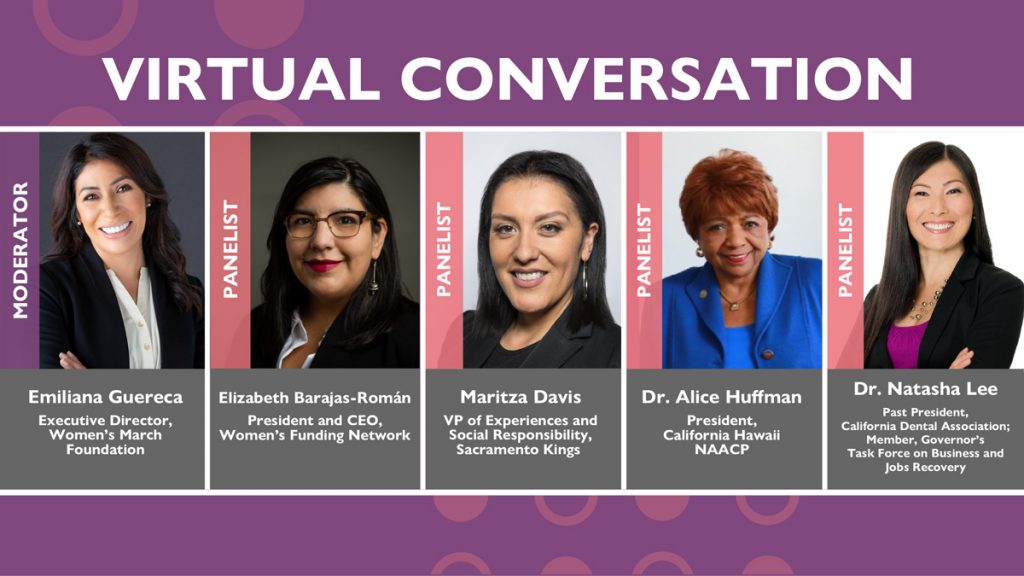
2. Leadership Stems from Mentorship
A great leader is guided by many mentors over the course of their career. From these mentors, they are able to build connections, networks, and improve the leadership pipeline for the next generation of leaders who will succeed them. Mentorship in leadership is especially important to minority women of color, who often feel unsupported and underrepresented it the workplace.
Elizabeth Barajas-Román expressed the joy and importance of mentorship in her own leadership journey when she said, “I’ve had mentorship relationships that have lasted a very long time, through multiple stages in the mentee’s career, and nothing gives me more joy than to seeing them move onto a new level of leadership and be able to actually have mentees themselves.”
Adding to the conversation, Dr. Natasha Lee shared how her early experiences in being mentored shaped her career and even said it “has made [her] really want to serve as a mentor for others.” It has shaped her life both professionally and personally.
3. Leadership is a Way of Life
Dr. Alice Huffman was kind enough to share her motivation and experience in leadership throughout the years. “I'm old enough to retire, I should have retired, but I'm not retiring yet, because I'm still working and still trying to get young people involved, still trying to get them out to vote, and it's just a way of life. And I don't know what else I could do besides do this.”
As we learned from our amazing panelists, leadership is a lifelong journey full of connections, changes, and communication. Leadership comes from mentors, colleagues, mentees, and more. Leadership means supporting communities and being supported by their communities in order to create long-lasting and positive change in the world. And most importantly, leadership is possible for everyone.
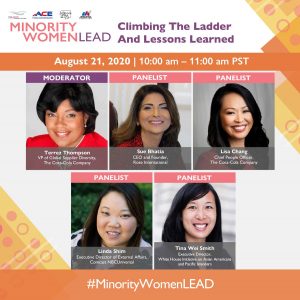 Climbing the Ladder and Lessons Learned
Climbing the Ladder and Lessons Learned
Watch the full conversation here.
1. Successful leaders always keep learning
As the world continues to evolve and change, so too must leaders adapt and learn to navigate the shifting landscape. Moderator Terrez Thompson shared a key part of her leadership journey, “It’s just a lesson for me: no matter how long you’ve been around or how old you get, you can always learn something.”
Just like how mentees will always be learning from their mentors, so too can mentors learn from their mentees despite the difference in age or stage of profession. As a leader who has been mentored, and mentors others, Linda Shim has one often-repeated piece of advice to share: “I encourage people to [ask questions], but do it with confidence.”
2. Successful leaders ask for help
Showing any signs of vulnerability or insecurity feels like a weakness that successful leaders can’t afford to have, but vulnerability can actually be a strength when you have a strong community and trusted network to support you. As Sue Bhatia shared from personal experience, “Knowing that you’re not the only one going through what you’re going through is important, and you can dismiss [negative thoughts] more easily.”
3. Successful leaders carve their own paths
People don’t become leaders over night. They are continuously learning and putting in hours of hard work every day to become the best in their profession, field, and career. For minority women and people of color, the journey is ten times harder than their privileged peers. Tina Wei Smith shared a key piece of wisdom when she said, “I would encourage them to really just focus on getting themselves ready to be that expert in that room, or to be that contributor, and to speak up even if they’re not asked to speak up. Really take the courage to have those opportunities.”
In this ever changing world, people will tell you what you need to do to become successful. But what works for them may not necessarily work for you. Find your own path, and as Lisa Chang says, “Don’t let someone else define that success for you.”
Bringing Women of Color to the Table
Watch the full conversation here.
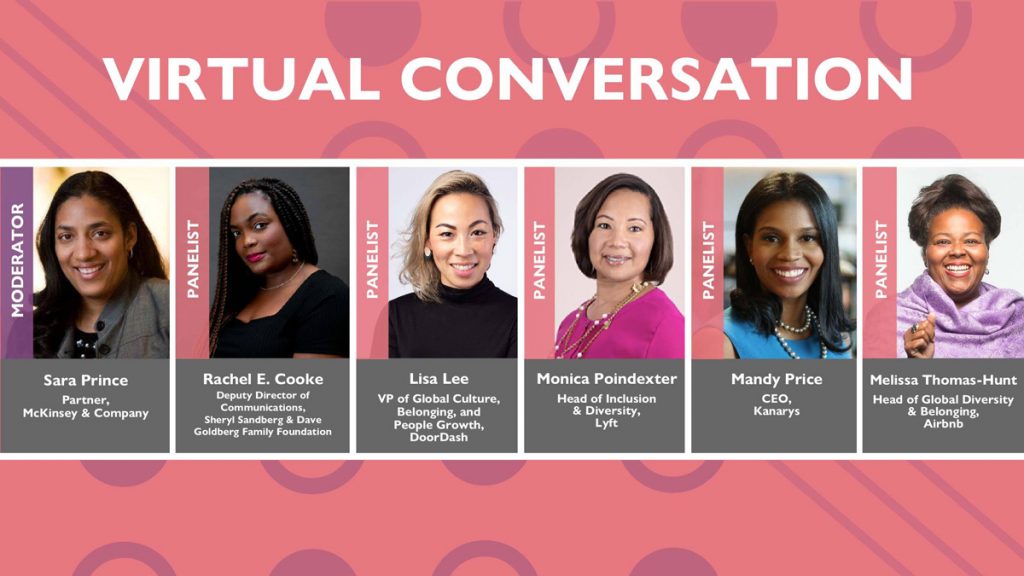
1. Diversity, Equity, and Inclusion Work is Continuous
While others may shy away from the complexity and difficulty of DE&I work, Mandy Price understands that “this is hard work, it’s not something that is gonna be changed over night. But we have make sure that we continue to keep the focus on these issues, and to keep the accountability there.”
Melissa Thomas-Hunt expressed her opinion on the topic as a whole: “I think it’s important for us to continue to keep front and center, that this is really hard work, that we have to be persistent, that we need all of the enthusiasm, exuberance to show up day in and day out, and for us not to lose momentum.”
2. Diversity, Equity, and Inclusion is a Collective Effort
From this amazing panel, we learned that diversity, equity, and inclusion work is not the responsibility of one person, race, or gender. It is a difficult task that cannot be shouldered alone if we want to see sustainable success. Keynote speaker Susan Jin Davis expressed that, “the idea of embedding this work broadly is really important and making it everyone’s responsibility to do something about it.”
Monica Poindexter shared her personal experience with delegating and speaking up in difficult and chaotic situations: “I have realized in these moments that when I need something, I say something, and I ask for what I need. And it’s amazing what response you get, not only from your colleagues, but also from leaders across the organization.”
3. Diversity, Equity, and Inclusion is the Future
Although there has been much progress made over the last few years in the diversity, equity, and inclusion field, there is still so much more work to be done. As Rachel E. Cooke said, “I think the true mark of a good DE&I program at any company, is that if any one of us left that role, that work should still continue. The work should not fail if any one of us were to leave.”
Those who work in DE&I are hopeful, but realistic in their approach towards success. In fact, Lisa Lee said, “I’m a believer that slow and steady wins the race, that we got to keep going and make sure that there are even more women of color having a seat at the table."
And while it may be several years in the future before many DE&I leaders can see the fruition of their efforts, as Moderator Sarah Prince shared, they are “hopeful that all of this will yield a different outcome” and that the future will have diversity, equity, and inclusion as the norm.
Feeling inspired by all of this women wisdom?
Visit the Minority Women Lead website and watch all the inspiring virtual conversations that occurred last month.
Continue the conversation by joining our Minority Women Lead Newsletter, where we'll keep you updated on our panelists and share new stories from powerful women leaders.

